1958 FIFA World Cup
| Världsmästerskapet i Fotboll Sverige 1958 |
|
|---|---|
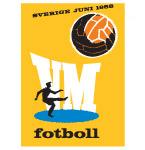 1958 FIFA World Cup official logo |
|
| Tournament details | |
| Host country | |
| Dates | 8 June – 29 June |
| Teams | 16 (from 3 confederations) |
| Venue(s) | 12 (in 12 host cities) |
| Final positions | |
| Champions | |
| Runner-up | |
| Third place | |
| Fourth place | |
| Tournament statistics | |
| Matches played | 35 |
| Goals scored | 126 (3.6 per match) |
| Attendance | 919,580 (26,274 per match) |
| Top scorer(s) | |
|
← 1954
1962 →
|
|
The 1958 FIFA World Cup, the sixth staging of the World Cup, was hosted by Sweden from 8 June to 29 June. Sweden were chosen as hosts by FIFA in June 1950. The tournament was won by Brazil, who beat Sweden 5–2 in the final for their first title. To date, this marks the only occasion that a World Cup staged in Europe was not won by a European team. The group stage of the tournament saw a format change whereby extra time was no longer played and instead teams tied in second and third place at the end of the group phase would instead contest a play-off game. The tournament is notable for marking the debut on the world stage of a then largely unknown 17-year-old Pelé.
Contents |
Qualification

This World Cup saw the entry and qualification of the Soviet Union for the first time, and the qualification of all the United Kingdom's Home Nations: England, Scotland, Wales, and Northern Ireland.
Aside from the main European zone matches, Wales, which finished second in its group behind Czechoslovakia, was drawn into a play-off with Israel after Israel won its group by default because its three opponents, Turkey, Indonesia and Sudan, refused to play. FIFA had imposed a rule that no team would qualify without playing at least one match, something that had happened in several previous World Cups. Wales won the play-off and qualified.
On 8 February, in Solna, Lennart Hyland and Sven Jerring presented the results of the draw where the qualified teams were divided into four groups. There was no seeding, apart from each group containing one western European team, one eastern European team, one of the four British teams that had qualified, and one from the American continent. [1]
This tournament saw the first, and as of 2010 the only, appearance of Wales at a World Cup finals. It also marked the debuts of the Soviet Union and Northern Ireland. Argentina appeared for the first time since 1934. This would be Paraguay's last finals appearance until 1986 and Austria's last until 1978.
The 1958 competition remains the only occasion on which Italy failed to qualify (Italy did not take part in the 1930 tournament but there was no qualification for that competition). Other teams failing to qualify were Uruguay and Belgium.
Summary
The format of the competition changed from 1954: 16 teams still competed in four groups of four, but this time each team played each of the other teams in its group at least once, without extra time in the event of a draw. Instead, if second and third place finished on the same points, then there would be a play-off with the winner going through. If a play-off resulted in a draw, then goal average from the group games would have been used to determine who went through to the next round. If the goal averages were equal then lots would have been drawn. If the first two teams finished on equal points then goal average would decide who was placed first and second. These arrangements had not been finalised by the time the tournament started and were still being debated as it progressed. The organizing committee even released press statements stating that goal average would be counted before resorting to playoffs. However this idea was eventually rejected.
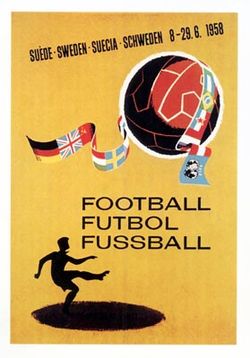
In Group 4, Pelé did not play until the last of Brazil's group games, against the Soviet Union. He failed to score, but Brazil won the game 2–0 (much thanks to an impressive exhibition of dribbling prowess by his partner Garrincha) and the group by two points. Previously, they had drawn 0–0 with England in what was the first ever goalless game in World Cup history. Eventually, the Soviet Union and England went to a playoff game, in which Anatoli Ilyin scored in the 67th minute to knock England out, while Austria had already been eliminated. The English side had been weakened by the Munich Air Disaster which killed 3 internationals on the books of Manchester United, including England's young star Duncan Edwards.
Playoffs were also needed in Group 1 (Northern Ireland beat Czechoslovakia to join the defending champions West Germany in the quarter-finals) and Group 3 (Wales topped Hungary to advance with hosts Sweden). Hungary had become a spent force after their appearance in the final of the previous tournament. They had lost their best players two years before, when they fled in the wake of the failed uprising against the communist regime. In a rather restrictive sense, from the 1954 team, only goalkeeper Gyula Grosics, defender Jozsef Bozsik and forward Nándor Hidegkuti remained.
Of the British nations, it was arguably Scotland who had the toughest group, having to face Yugoslavia, Paraguay, and France. France topped Group 2, with Just Fontaine netting six goals. Yugoslavia finished second, while Scotland came in last.
The quarter-finals saw France's Just Fontaine continue in similar form to the group stage, managing another two goals as France triumphed over Northern Ireland. West Germany's Helmut Rahn put them into the semi-finals with a single goal against Yugoslavia, while Sweden went though at the expense of USSR. The other game in the quarter-finals saw Pelé score the only goal against Wales.
In the semi-finals, Sweden continued their strong run as they defeated West Germany 3–1 in a vicious game that saw the German player Erich Juskowiak sent off (the first ever German player to be sent off in an international game) and German team captain Fritz Walter injured, which further weakened the German team (substitutes were first allowed in the 1970 FIFA World Cup).
While another goal from Fontaine of France added to his impressive tally, it was not enough to prevent Brazil thundering into the Final as a Pelé hat-trick gave them a 5–2 victory. The French were effectively down to ten men from the 30th minute onwards when their most experienced defender and captain Robert Jonquet got incapacitated after a clash with Vavá. The third place match saw Fontaine score four more goals as France defeated Germany 6-3. This brought his total to 13 goals in one competition, a record that still stands.
Final
The final was played in Solna, in the Råsunda Stadium, as 50,000 people watched in amazement as the Brazilians went a goal down after four minutes. The Brazilians were not dismayed, and Vavá equalised shortly afterwards and then put them a goal ahead before half time. In the second half Pelé outshone everyone, notching up two goals, including the first one where he lobbed the ball over Bengt Gustavsson then followed it with a precise volley shot. Zagallo added a goal in between, and Sweden managed a consolation goal. But the game really belonged to Pelé, and the Jules Rimet trophy belonged to Brazil - the World Cup winners.
The Final holds many records in World Cup history. Pele became the youngest player to play a World Cup Finals, the youngest scorer in a World Cup Final and the youngest player to win a World Cup Winner's Medal. Also, Nils Liedholm became the oldest player to score in a World Cup Final (35 years, 263 Days). Moreover, this final had the highest number of goals scored by a winning team (5), the highest number of total goals scored (7), together with the World Cup finals in 1970 and 1998, it also had the greatest victory margin (3).
For both teams who took part this was a classic Final. Sweden played its first and only World Cup Final, the best performance by the Sweden team in a World Cup. Brazil won its first World Cup Final and as Pele himself as he believes that the match between Sweden and Brazil must be considered as the most classic World Cup final in history.
Venues
A total of twelve cities hosted the tournament:
| City | Stadium | Capacity | Built |
| Stockholm | Råsunda Stadium** | 50,000 | 1937 |
| Gothenburg | Ullevi* | 50,000 | 1958 |
| Malmö | Malmö Stadion* | 30,000 | 1958 |
| Eskilstuna | Tunavallen | 20,000 | 1924 |
| Norrköping | Idrottsparken** | 20,000 | 1904 |
| Sandviken | Jernvallen | 20,000 | 1938 |
| Helsingborg | Olympia | 16,000 | 1898 |
| Borås | Ryavallen | 15,000 | 1941 |
| Halmstad | Örjans Vall | 15,000 | 1922 |
| Örebro | Eyravallen | 13,000 | 1923 |
| Uddevalla | Rimnersvallen | 12,000 | 1921 |
| Västerås | Arosvallen | 10,000 | 1932 |
- * Built for the World Cup
- ** Expanded for the World Cup
Note that some matches brought more than the venue's actual capacity.
Seeding
| Western European Pot | Eastern European Pot | British Pot | Americas Pot |
|---|---|---|---|
|
Squads
For a list of all squads that appeared in the final tournament, see 1958 FIFA World Cup squads.
Results
Group stage
Group 1
Beforehand, Group 1 was widely considered to be the World Cup´s strongest preliminary group. The West Germans, surprise world champions four years ago, were still very strong, and fielded an exciting young forward in Uwe Seeler. But the Germans this time had to contend with a real powerhouse in Argentina´s team, competing for the first time since 1934. In fact, many experts thought Argentina had a very realistic chance of winning the World Cup this time.
Czechoslovakia was a fairly strong team with a rich football tradition, and was considered to be no walk-over for the Germans or the Argentinians, but nobody expected much from tiny Northern Ireland. But the Irish had already shown that they could be a danger to anyone, by knocking out double world champions Italy in the qualifying tournment for the World Cup.
In the end, the Irish did pull off one of biggest upsets in World Cup Finals history by qualifying for the quarterfinals, while Argentina and Czechoslovakia were eliminated. In their last game the Irish were only 12 minutes from eliminating the West Germans, as well. Seeler scored in the 78th minute against Northern Ireland, thus salvaging a draw. Had the Irish won, the Czechs would have followed the Irish into the quarterfinals.
Finishing last in the group with a -5 goal differential was a horrible blow for Argentina, and on the way home the Argentinian team chose to land in Montevideo, Uruguay, instead of Buenos Aires, to escape the wrath of angry football fans.
| Team | Pld | W | D | L | GF | GA | GAv | Pts |
|---|---|---|---|---|---|---|---|---|
| 3 | 1 | 2 | 0 | 7 | 5 | 1.40 | 4 | |
| 3 | 1 | 1 | 1 | 4 | 5 | 0.80 | 3 | |
| 3 | 1 | 1 | 1 | 8 | 4 | 2.00 | 3 | |
| 3 | 1 | 0 | 2 | 5 | 10 | 0.50 | 2 |
| 8 June 1958 19:00 (CET) |
West Germany |
3 – 1 | Malmö Stadion, Malmö Attendance: 31,156 Referee: Leafe (England) |
|
|---|---|---|---|---|
| Rahn Seeler |
Report | Corbatta |
| 8 June 1958 19:00 (CET) |
Northern Ireland |
1 – 0 | Örjans Vall, Halmstad Attendance: 10,647 Referee: Seipelt (Austria) |
|
|---|---|---|---|---|
| Cush |
Report |
| 11 June 1958 19:00 (CET) |
Argentina |
3 – 1 | Örjans Vall, Halmstad Attendance: 14,174 Referee: Ahlner (Sweden) |
|
|---|---|---|---|---|
| Corbatta Menéndez Avio |
Report | McParland |
| 11 June 1958 19:00 (CET) |
West Germany |
2 – 2 | Olympiastadion, Helsingborg Attendance: 25,000 Referee: Ellis (England) |
|
|---|---|---|---|---|
| Schäfer Rahn |
Report | Dvořák Zikán |
| 15 June 1958 19:00 (CET) |
West Germany |
2 – 2 | Malmö Stadion, Malmö Attendance: 21,990 Referee: Campos (Portugal) |
|
|---|---|---|---|---|
| Rahn Seeler |
Report | McParland |
| 15 June 1958 19:00 (CET) |
Czechoslovakia |
6 – 1 | Olympiastadion, Helsingborg Attendance: 16,418 Referee: Ellis (England) |
|
|---|---|---|---|---|
| Dvořák Zikán Feureisl Hovorka |
Report | Corbatta |
Play-off
| 17 June 1958 19:00 (CET) |
Northern Ireland |
2 – 1 (a.e.t.) | Malmö Stadion, Malmö Attendance: 6,196 Referee: Guigue (France) |
|
|---|---|---|---|---|
| McParland |
Report | Zikán |
Group 2
The second group saw the largest number of goals scored in a single group in the 1958 World Cup with 27 goals in total (4.5 goals per game). Just Fontaine of France scored six of his 13 goals in the tournament, making him the tournament's top scorer going in to the quarter-finals.
None of the teams in this group had been particularily successful at previous World Cups. France had not achieved any real World Cup success, Yugoslavia had not been able to replicate their Semi-final success of 1930 and Paraguay and Scotland were considered underdogs during the tournament.
France won the group ahead of Yugoslavia and would go on to finish third.
| Team | Pld | W | D | L | GF | GA | GAv | Pts |
|---|---|---|---|---|---|---|---|---|
| 3 | 2 | 0 | 1 | 11 | 7 | 1.57 | 4 | |
| 3 | 1 | 2 | 0 | 7 | 6 | 1.17 | 4 | |
| 3 | 1 | 1 | 1 | 9 | 12 | 0.75 | 3 | |
| 3 | 0 | 1 | 2 | 4 | 6 | 0.67 | 1 |
| 8 June 1958 19:00 (CET) |
France |
7 – 3 | Idrottsparken, Norrköping Attendance: 16,500 Referee: Gardeazabal (Spain) |
|
|---|---|---|---|---|
| Fontaine Piantoni Wisnieski Kopa Vincent |
Report | Amarilla Romero |
| 8 June 1958 19:00 (CET) |
Yugoslavia |
1 – 1 | Arosvallen, Västerås Attendance: 9,500 Referee: Wyssling (Switzerland) |
|
|---|---|---|---|---|
| Petaković |
Report | Murray |
| 11 June 1958 19:00 (CET) |
Yugoslavia |
3 – 2 | Arosvallen, Västerås Attendance: 12,000 Referee: Benjamin Griffiths (Wales) |
|
|---|---|---|---|---|
| Petaković Veselinović |
Report | Fontaine |
| 11 June 1958 19:00 (CET) |
Paraguay |
3 – 2 | Idrottsparken, Norrköping Attendance: 12,000 Referee: Orlandini (Italy) |
|
|---|---|---|---|---|
| Agüero Ré Parodi |
Report | Mudie Collins |
| 15 June 1958 19:00 (CET) |
France |
2 – 1 | Eyravallen, Örebro Attendance: 13,500 Referee: Brozzi (Argentina) |
|
|---|---|---|---|---|
| Piantoni Fontaine |
Report | Baird |
| 15 June 1958 19:00 (CET) |
Paraguay |
3 – 3 | Tunavallen, Eskilstuna Attendance: 12,000 Referee: Macko (Czechoslovakia) |
|
|---|---|---|---|---|
| Parodi Agüero Romero |
Report | Ognjanović Veselinović Rajkov |
Group 3
The Swedish hosts could count themselves lucky in ending up in a rather weak group, which they proceeded to win fairly easily with their powerful workmanlike football. The group did of course include Hungary, which had been considered by far the best team in the world some years ago - although the Hungarians could not beat West Germany in the final of the World Cup in 1954. But the Hungarian team had been dealt a blow by the Hungarian Revolution of 1956, after which star players like Sándor Kocsis and Ferenc Puskás left their homeland. Striker Nándor Hidegkuti was still playing, but he was by now 36 years old and nowhere near his former form.
In spite of Hungary´s recent travails, everyone expected the Hungarian players to advance from their group. The success of Wales therefore was a great surprise, but the Welsh managed to draw all the group games and then beat the once-mighty Hungarians in a play-off match to decide which nation should follow Sweden into the knock-out stage. Had goal difference been the decider, Hungary would have gone through, as the Hungarians had a goal ratio 6-3 compared to 2-2 of Wales. As it was, Wales had the honour of meeting Brazil in the Quarterfinals and becoming the recipient of young Pelé´s first World Cup goal.
The match between Hungary and Mexico in Sandviken became the northern-most World Cup match in history.
| Team | Pld | W | D | L | GF | GA | GAv | Pts |
|---|---|---|---|---|---|---|---|---|
| 3 | 2 | 1 | 0 | 5 | 1 | 5.00 | 5 | |
| 3 | 0 | 3 | 0 | 2 | 2 | 1.00 | 3 | |
| 3 | 1 | 1 | 1 | 6 | 3 | 2.00 | 3 | |
| 3 | 0 | 1 | 2 | 1 | 8 | 0.13 | 1 |
| 8 June 1958 14:00 (CET) |
Sweden |
3 – 0 | Råsunda Stadium, Solna Attendance: 45,000 Referee: Latychev (Soviet Union) |
|
|---|---|---|---|---|
| Simonsson Liedholm |
Report |
| 8 June 1958 19:00 (CET) |
Hungary |
1 – 1 | Jernvallen, Sandviken Attendance: 20,000 Referee: Codesal (Uruguay) |
|
|---|---|---|---|---|
| Bozsik |
Report | J. Charles |
| 11 June 1958 19:00 (CET) |
Mexico |
1 – 1 | Råsunda Stadium, Solna Attendance: 25,000 Referee: Lemesic (Yugoslavia) |
|
|---|---|---|---|---|
| Belmonte |
Report | I. Allchurch |
| 12 June 1958 19:00 (CET) |
Sweden |
2 – 1 | Råsunda Stadium, Solna Attendance: 40,000 Referee: Mowat (Scotland) |
|
|---|---|---|---|---|
| Hamrin |
Report | Tichy |
| 15 June 1958 14:00 (CET) |
Sweden |
0 – 0 | Råsunda Stadium, Solna Attendance: 35,000 Referee: Van Nuffel (Belgium) |
|
|---|---|---|---|---|
| Report |
| 15 June 1958 19:00 (CET) |
Hungary |
4 – 0 | Jernvallen, Sandviken Attendance: 13,300 Referee: Eriksson (Finland) |
|
|---|---|---|---|---|
| Tichy Sándor Bencsics |
Report |
Play-off
| 17 June 1958 19:00 (CET) |
Wales |
2 – 1 | Råsunda Stadium, Solna Attendance: 20,000 Referee: Latychev (Soviet Union) |
|
|---|---|---|---|---|
| I. Allchurch Medwin |
Report | Tichy |
Group 4
In advance the experts considered the Fourth group the toughest one in this World Cup. Notwithstanding the disappointments of the previous tournaments, Brazil was considered extremely powerful, as would indeed prove to be the case. The Soviet Union was the reigning Olympic champion and Austria had won the bronze medal in the 1954 World Cup in Switzerland, four years earlier. And although England was not considered at its very best it was still always a formidable team.
In the end, this group had the highest average attendance, even higher than Group 3 with the host nation, Sweden.
The quality of the football in this group did not quite live up to expectations, however. Only 16 goals were scored in the whole group, lower than in any of the others groups. And when England and Brazil drew 0-0, it was the first time in World Cup history that a game ended with no goals.
Brazil won the group without conceding a single goal. The teenage Pele played Brazil´s last game against the Soviet Union. He did not score but drew wild reviews for his play. The Soviet Union, in its first World Cup, took second place.
| Team | Pld | W | D | L | GF | GA | GAv | Pts |
|---|---|---|---|---|---|---|---|---|
| 3 | 2 | 1 | 0 | 5 | 0 | ∞ | 5 | |
| 3 | 1 | 1 | 1 | 4 | 4 | 1.00 | 3 | |
| 3 | 0 | 3 | 0 | 4 | 4 | 1.00 | 3 | |
| 3 | 0 | 1 | 2 | 2 | 7 | 0.29 | 1 |
| 8 June 1958 19:00 (CET) |
Brazil |
3 – 0 | Rimnersvallen, Uddevalla Attendance: 17,778 Referee: Guigue (France) |
|
|---|---|---|---|---|
| Mazzola Nílton Santos |
Report |
| 8 June 1958 19:00 (CET) |
Soviet Union |
2 – 2 | Ullevi, Gothenburg Attendance: 49,348 Referee: Zsolt (Hungary) |
|
|---|---|---|---|---|
| Simonyan A. Ivanov |
Report | Kevan Finney |
| 11 June 1958 19:00 (CET) |
Brazil |
0 – 0 | Ullevi, Gothenburg Attendance: 40,895 Referee: Dusch (West Germany) [2] |
|
|---|---|---|---|---|
| Report |
| 11 June 1958 19:00 (CET) |
Soviet Union |
2 – 0 | Ryavallen, Borås Attendance: 21,239 Referee: Jorgensen (Denmark) |
|
|---|---|---|---|---|
| A. Ivanov V. Ivanov |
Report |
| 15 June 1958 19:00 (CET) |
England |
2 – 2 | Ryavallen, Borås Attendance: 15,872 Referee: Bronkhorst (Netherlands) |
|
|---|---|---|---|---|
| Haynes Kevan |
Report | Koller Körner |
| 15 June 1958 19:00 (CET) |
Brazil |
2 – 0 | Ullevi, Gothenburg Attendance: 50,928 Referee: Guigue (France) |
|
|---|---|---|---|---|
| Vavá |
Report |
Play-off
| 17 June 1958 19:00 (CET) |
Soviet Union |
1 – 0 | Ullevi, Gothenburg Attendance: 23,182 Referee: Dusch (West Germany) |
|
|---|---|---|---|---|
| Ilyin |
Report |
Knockout stage
| Quarter-finals | Semi-finals | Final | ||||||||
| 19 June – Malmö | ||||||||||
| |
1 | |||||||||
| 24 June - Gothenburg | ||||||||||
| |
0 | |||||||||
| |
1 | |||||||||
| 19 June - Solna | ||||||||||
| |
3 | |||||||||
| |
2 | |||||||||
| 29 June – Solna | ||||||||||
| |
0 | |||||||||
| |
2 | |||||||||
| 19 June - Norrköping | ||||||||||
| |
5 | |||||||||
| |
4 | |||||||||
| 24 June – Solna | ||||||||||
| |
0 | |||||||||
| |
2 | Third place | ||||||||
| 19 June - Gothenburg | ||||||||||
| |
5 | |||||||||
| |
1 | |
3 | |||||||
| |
0 | |
6 | |||||||
| 28 June - Gothenburg | ||||||||||
Quarter-finals
| 19 June 1958 19:00 (CET) |
France |
4 – 0 | Idrottsparken, Norrköping Attendance: 12,000 Referee: Gardeazabal (Spain) |
|
|---|---|---|---|---|
| Wisnieski Fontaine Piantoni |
Report |
| 19 June 1958 19:00 (CET) |
Sweden |
2 – 0 | Råsunda Stadium, Solna Attendance: 45,000 Referee: Leafe (England) |
|
|---|---|---|---|---|
| Hamrin Simonsson |
Report |
| 19 June 1958 19:00 (CET) |
Brazil |
1 – 0 | Ullevi, Gothenburg Attendance: 25,000 Referee: Seipelt (Austria) |
|
|---|---|---|---|---|
| Pelé |
Report |
| 19 June 1958 19:00 (CET) |
West Germany |
1 – 0 | Malmö Stadion, Malmö Attendance: 20,000 Referee: Wyssling (Switzerland) |
|
|---|---|---|---|---|
| Rahn |
Report |
Semi-finals
| 24 June 1958 19:00 (CET) |
France |
2 – 5 | Råsunda Stadium, Solna Attendance: 27,000 Referee: Benjamin Griffiths (Wales) |
|
|---|---|---|---|---|
| Fontaine Piantoni |
Report | Vavá Didi Pelé |
| 24 June 1958 19:00 (CET) |
West Germany |
1 – 3 | Ullevi, Gothenburg Attendance: 50,000 Referee: Zsolt (Hungary) |
|
|---|---|---|---|---|
| Schäfer |
Report | Skoglund Gren Hamrin |
Match for third place
| 28 June 1958 17:00 (CET) |
West Germany |
3 – 6 | Ullevi, Gothenburg Attendance: 25,000 Referee: Brozzi (Argentina) |
|
|---|---|---|---|---|
| Cieslarczyk Rahn Schäfer |
Report | Fontaine Kopa Douis |
Final
| 29 June 1958 15:00 (CET) |
Sweden |
2 – 5 | Råsunda Stadium, Solna Attendance: 51,800 Referee: Maurice Guigue (France) |
|
|---|---|---|---|---|
| Liedholm Simonsson |
Report | Vavá Pelé Zagallo |
Scorers
|
|
|
FIFA Retrospective Ranking
In 1986, FIFA published a report that ranked all teams in each World Cup up to and including 1986, based on progress in the competition, overall results and quality of the opposition.[3] The rankings for the 1958 tournament were as follows:
.svg.png) Brazil
Brazil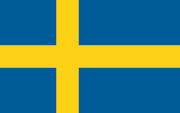 Sweden
Sweden France
France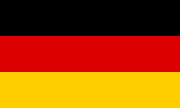 West Germany
West Germany Yugoslavia
Yugoslavia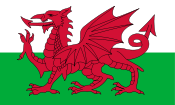 Wales
Wales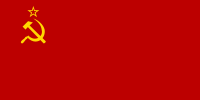 Soviet Union
Soviet Union Northern Ireland
Northern Ireland Czechoslovakia
Czechoslovakia.svg.png) Hungary
Hungary England
England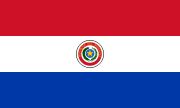 Paraguay
Paraguay.svg.png) Argentina
Argentina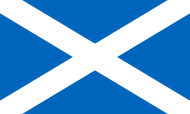 Scotland
Scotland Austria
Austria.svg.png) Mexico
Mexico
See also
- Conspiracy 58
References
- ↑ History of the World Cup Final Draw
- ↑ FIFA anachronistically indicates the referee as a representative from 'GER' and not 'FRG' as it should have been at the time.
- ↑ http://www.fifa.com/mm/document/afdeveloping/technicaldevp/50/09/00/fwc_mexico_1986_en_part4_279.pdf page 45
External links
|
||||||||
|
||||||||||||||||||||
|
||||||||||||||||||||
|
|||||||||||||||||||||||||||||
